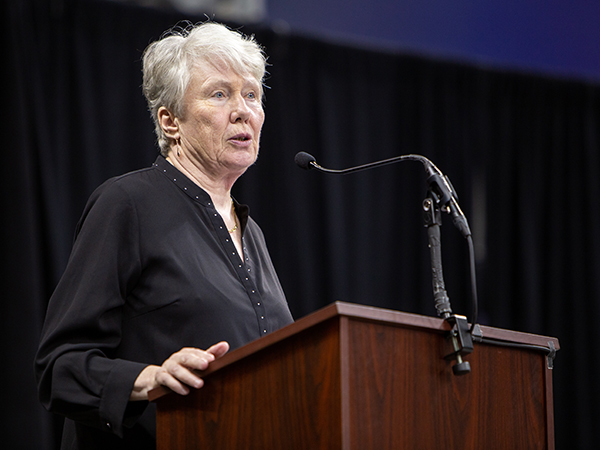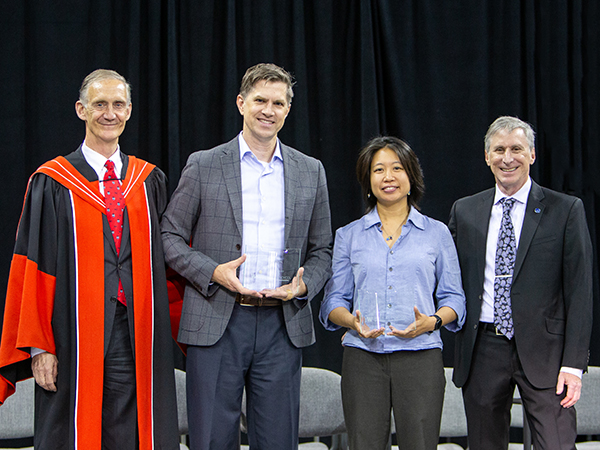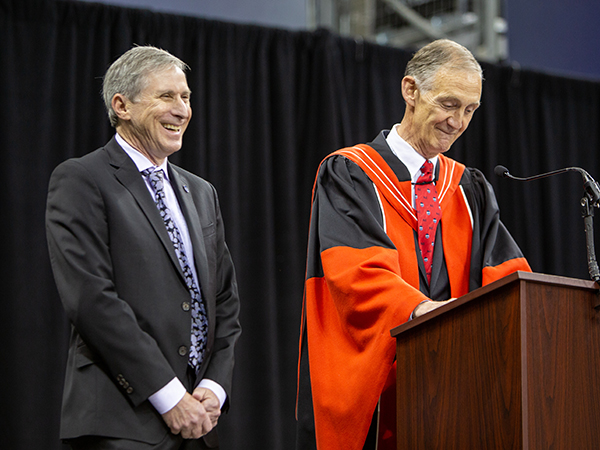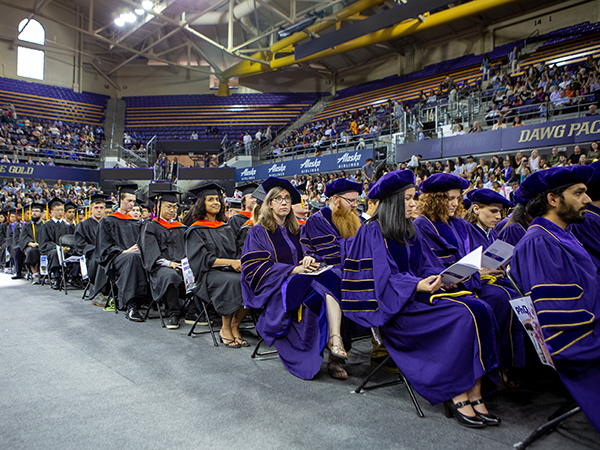On Friday, the Paul G. Allen School celebrated the Class of 2019 as the graduates embarked on the next stage in their academic or professional journeys. In addition to granting roughly 575 total degrees this year — including around 400 bachelor’s degrees — the Allen School celebrated the contributions of two outstanding alumni, Joe Heitzeberg and Tessa Lau, and welcomed speaker Maria Klawe, President of Harvey Mudd College, who sent the new graduates on their way with words of wisdom and inspiration.
As is tradition, Allen School Director Hank Levy opened the proceedings by welcoming the nearly 2,500 family and friends in attendance at the University of Washington’s Hec Edmundson Pavilion in the Alaska Airlines Arena. This year was especially poignant since it was Levy’s last at the helm of the program he has led for the past 13 years. When he turned the podium over to professor Ed Lazowska, Levy was asked to remain on stage while the latter paid tribute to what he has accomplished during his tenure — first as chair of the department, and then as the first-ever director of the school. Along the way, Levy presided over a tripling of the undergraduate student body and a doubling of our graduate program while overseeing the design and construction of a second building, the Bill & Melinda Gates Center, to enable the school’s continued expansion.
“Hank took us from being an excellent computer science program to an elite one,” Lazowska said, as Levy received a standing ovation from the assembled graduates, faculty, and guests.
Special guest Maria Klawe — the first woman President of Harvey Mudd College and previously, first woman Dean of Engineering at Princeton University — continued on that theme as she reminded the assembled graduates that “you are graduating from one of the very, very, very best computer science departments in the world.”
Klawe, who has made increasing diversity in science and engineering disciplines one of the hallmarks of her career, urged the graduates to speak up when it comes to supporting diversity in their field. When it comes to gender, race, sexual orientation, and income status, “These things should have absolutely nothing to do with whether you become a computer scientist,” she said. Noting that the field will never meet the demand for talent unless it recruits women and underrepresented minorities, she suggested there was an even more compelling reason for it to do so. “Diverse teams find better solutions,” she said, crediting the Allen School for being ahead of its peers when it comes to diversity.

Klawe also touched upon another topic that often comes up in conversations about diversity and belonging: imposter syndrome. Although she did not explicitly use the phrase, Klawe acknowledged that even she sometimes awoke with a “voice of failure” in her head. Her advice to graduates who experienced the same? “Don’t listen,” Klawe said. “Believe that you can have impact in the world. Believe that you can take on major challenges.”
“You are going to be amazing,” she concluded, “and I am so proud to be here at your commencement ceremony.”
To drive home the point, Lazowska retook the stage to announce the 2019 recipients of the Allen School Alumni Impact Awards. The award recognizes two alumni annually who are building on their Allen School education to change the world. The first honoree, Tessa Lau (Ph.D., ‘01), earned her degree working with professor Daniel Weld on machine learning with an emphasis on human-computer interaction and intelligent systems “before machine learning became cool and everybody started doing it,” as Lazowska put it. Lau spent 11 years at IBM Research before joining Willow Garage, where she developed simple interfaces for personal robots. Having once held the title of “Chief Robot Whisperer” at a company she co-founded, Savioke, that produced the world’s first hotel delivery robot, Lau is currently founder and CEO of Dusty Robotics. Her goal, as Lazowska put it, is to enable robots to do “real work, in the real world, alongside real people.”

The second honoree, Joe Heitzeberg (B.S., ‘95), has had a varied and successful career in the startup world. Following his graduation from UW, Heitzeberg began his career as a software engineer at Paul Allen-backed StarWave. After returning to school to earn his MBA at MIT’s Sloan School of Business, he built a string of successful startups beginning with SnapVine, which was acquired by WhitePages, and MediaPiston, which was acquired by oDesk, before taking the helm at Madrona Venture Labs, a “startup studio” that builds startups from scratch and spins them out as independent companies. Heitzeberg’s latest venture is Crowd Cow, a company that he co-founded to connect farmers and consumers to help people access high-quality craft meat.
In addition to awarding degrees, the Allen School honored a number of students and faculty for academic excellence, mentorship, research, and service. Allen School advisers Crystal Eney and Raven Avery kicked off the proceedings by recognizing two graduating seniors with Service Awards: Aishwarya Mandyam and Alex Banh. Mandyam, who earned bachelor’s degrees in Computer Science and Philosophy with a minor in Neural Computation & Engineering, served as a member of the Allen School’s Diversity Committee and President of the UW chapter of the Association for Computing Machinery (UW ACM). Her passion for building an inclusive community for her peers previously earned her a place among the Husky 100. Banh, a Computer Science major, served as lead ambassador for the CSE Ambassadors program that engages thousands of pre-college students each year in computer science activities. He also served as the Allen School advising team’s first full-time summer outreach assistant.
The Best Senior Thesis Award went to Nelson Liu, who earned his degree in Computer Science and Linguistics working with professor Noah Smith of the Allen School’s Natural Language Processing Group. Liu completed his thesis on the use of recurrent neural networks in natural language processing that included a new discovery about the ability of RNNs to “remember” farther into the past if the data they are trained on has the properties of natural language. Liu’s work earned a Best Paper Award at the Association for Computational Linguistics’ Workshop on Representational Learning for NLP, and according to Smith, will change the way the NLP field thinks about RNNs — an example of Liu’s “high motivation to do things no one has done before,” he said. Liu will pursue a Ph.D. in Computer Science at Stanford University.
Five graduating students were recognized with Outstanding Senior Awards: Ryan Feng, Nelson Liu, Alison Ng, Mitali Palekar, and Hannah Werbel. Feng, who earned his bachelor’s in Computer Engineering, has excelled in the classroom and in the lab as an undergraduate researcher in the Networks & Mobile Systems Lab led by professor Shyam Gollakota and the Personal Robotics Lab led by professor Siddhartha (Sidd) Srinivasa. Liu was called to the stage a second time in recognition of his research that had earned him Best Senior Thesis as well as a Graduate Research Fellowship from the National Science Foundation. Ng, who majored in Computer Engineering, was previously recognized among the Husky 100 for her leadership on the Allen School’s Student Advisory Council and service to her fellow students as a peer adviser. Palekar, another Husky 100 honoree and Allen School peer adviser, earned her degree in Computer Science with interdisciplinary honors and served as President of the UW chapter of the Society of Women Engineers. Last but not least, Werbel, who graduated with a degree in Computer Science with interdisciplinary honors and minors in Mathematics and Physics, distinguished herself during her time at UW by earning both the President’s Freshman Medal and the Dean’s Medal from the College of Arts & Sciences.
UW ACM Chair Armaan Sood announced lecturer Justin Hsia as the recipient of the 2019 ACM Teaching Award, which is presented to an outstanding faculty member on behalf of the student body. Hsia was cited for his commitment to making complicated (“or even dull”) topics interesting and engaging, and for encouraging students to provide feedback throughout his courses. He was also celebrated for his focus on improving the teaching assistant (TA) experience. It was fitting, then, that Hsia later returned to the stage to recognize some of those very TAs with the Bob Bandes Memorial Excellence in Teaching Awards. These awards honor outstanding TAs who devote themselves to promoting computer science education and giving back to the school community. The three winners were master’s graduate Joshua Fan, who TAed for multiple courses, primarily Foundations of Computing 2; Cherie Ruan, who served as TA coordinator for the school’s introductory programming courses while earning her bachelor’s in Computer Science and Informatics; and Robert Weber, a current Ph.D. student in the Theory of Computation group who has TAed for multiple courses related to data structures and algorithms. Honorable mentions went to Avidant Bhagat, a Computer Science graduate who TAed for Software Design & Implementation every quarter this year; Zachary Chun, who graduated with a bachelor’s in Computer Science after TAing for 10 quarters, including introductory programming and data structures courses; and Erik Hoberg, who TAed for nine quarters in a variety of courses, many geared toward non-majors.
After handing out diplomas and hooding the Ph.D.s, Levy closed his final Allen School graduation celebration with some parting words to the newly-minted graduates. “I’d like to say one more thing to our students,” he said. “You’re part of the Allen School CSE community, and we want to continue to be an active part of your lives. Basically, you’re stuck with us forever!”
Congratulations to the Class of 2019 — and thank you, Hank, for 13 years of outstanding leadership, service, and friendship to the Allen School community!
Photo credits: Matt Hagen





